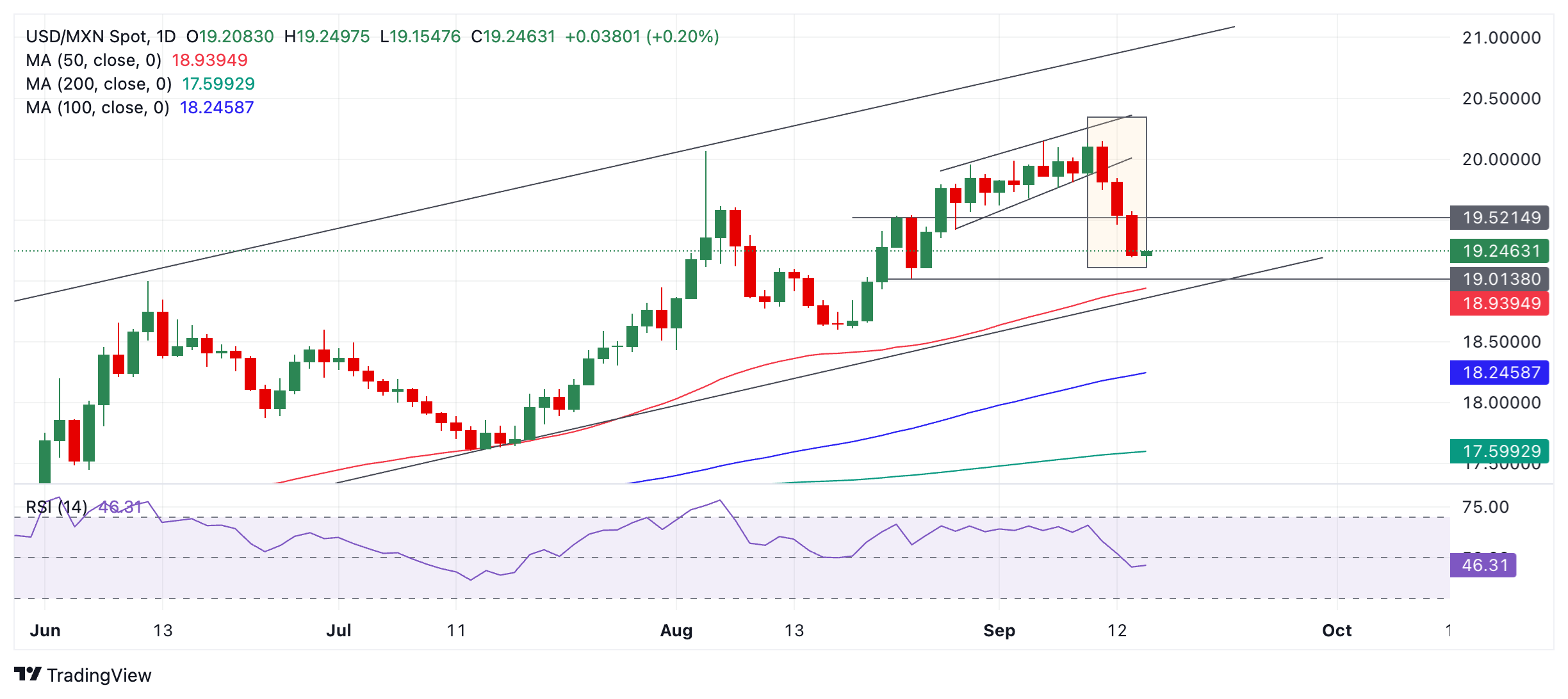Mexican Peso halts recovery after three up days in a row
- The Mexican Peso softens on Monday after three up days in a row.
- Increasing chances of deeper cuts to interest rates and slowing growth prospects had weakened the Peso’s peers.
USD/MXN’s daily chart paints three down days in a row, a pattern called “Three Black Crows”.
The Mexican Peso (MXN) trades moderately against its key pairs in early trade on Monday, after a week in which the Peso rose strongly, gaining about 3.9% on average versus the US Dollar (USD), the Euro (EUR) and the Pound Sterling (GBP).
Much higher probabilities of the US Federal Reserve (Fed) cutting interest rates by a larger-than-standard 0.50% at their meeting on Wednesday drove the appreciation in the Mexican currency against the USD last week.
From probabilities of only around 15% midweek, after the release of the US August Consumer Price Index (CPI), the market-based probabilities of a 0.50% cut by the Fed have now risen to about 59%, according to the CME FedWatch tool.
A larger cut to base interest rates in the US would expand the already wide interest rate differential with Mexico, where interest rates set by the Bank of Mexico (Banxico) are 10.75% versus the Fed’s 5.25%-5.50%. This encourages capital flows into the Mexican Peso because they can earn more interest.
Generally, downbeat expectations regarding the economic outlook for the United Kingdom (UK) and the Eurozone led MXN’s gains against the EUR and the GBP. Weak GDP growth data in the UK and a downward revision to GDP forecasts by the European Central Bank (ECB) acted as catalysts.
Mexican Peso recovers as political risk stabilizes
The Mexican Peso might be gaining a lift from evidence of a less negative assessment of its political outlook.
The currency lost over 10% in June following the general election at which the left-leaning Morena coalition won a supermajority. Investors feared the impact of reforms the party wanted to push through affecting the judicial system and industry regulators, which, they argued, risked reducing foreign investment into the country.
Rating agency Moody’s warned of a potential downgrade resulting from the reforms, and leading investment banks like Morgan Stanley and Bank of America also voiced concerns.
The first tranche of reforms was passed through the Mexican Senate last week and is on its way to becoming a part of the constitution, and although the news caused some volatility for the Peso, markets have since settled down.
Rating agency Fitch has put forward a more neutral, if still slightly negatively biased view, of the country’s creditworthiness in a recent note, reported Christian Borjon Valencia, an Analyst at FXStreet, on Friday.
“The rating outlook is stable, which means that we are seeing a balance between strengths and weaknesses. Before observing a direct downgrade of the sovereign rating, what could be expected from us is a change in the outlook, either from stable to positive or from stable to negative, the latter probably occurring,” said Gerardo Carrillo, Regional Director for LATAM at Fitch Ratings.
Further, Banxico’s Director of Economic Research, Alejandrina Salcedo, “stated that a robust environment in the rule of law can help generate conditions that encourage investment,” and “respecting the rule of law and public safety ‘would provide greater certainty, boost the flow of investment in all regions, and contribute to capitalizing on the opportunities offered by the relocation process,’” writes Borjon Valencia.
At the time of writing, one US Dollar (USD) buys 19.22 Mexican Pesos, EUR/MXN trades at 21.36, and GBP/MXN at 25.29.
Technical Analysis: USD/MXN prints bearish Three Black Crows
USD/MXN has broken out of a rising mini-channel within a wider rising channel and fallen for three days in a row. This has now formed a bearish Three Black Crows Japanese candlestick pattern on the daily chart (shaded rectangle), which indicates the probability that prices will fall even lower in the short term.
USD/MXN Daily Chart
The odds now favor the pair falling to the next downside support level at 19.01 (August 23 low), followed perhaps by further weakness to the 50-day Simple Moving Average (SMA) at 18.94 and the lower trendline of the larger channel a few pips below. At that level, the price will probably find firm support to stabilize and perhaps recover.
Even though the short-term trend is bearish, the medium and long-term trends are still bullish, suggesting the possibility that the pair could recover eventually and continue to trade higher.
Economic Indicator
Fed Interest Rate Decision
The Federal Reserve (Fed) deliberates on monetary policy and makes a decision on interest rates at eight pre-scheduled meetings per year. It has two mandates: to keep inflation at 2%, and to maintain full employment. Its main tool for achieving this is by setting interest rates – both at which it lends to banks and banks lend to each other. If it decides to hike rates, the US Dollar (USD) tends to strengthen as it attracts more foreign capital inflows. If it cuts rates, it tends to weaken the USD as capital drains out to countries offering higher returns. If rates are left unchanged, attention turns to the tone of the Federal Open Market Committee (FOMC) statement, and whether it is hawkish (expectant of higher future interest rates), or dovish (expectant of lower future rates).
Read more.Next release: Wed Sep 18, 2024 18:00
Frequency: Irregular
Consensus: 5.25%
Previous: 5.5%
Source: Federal Reserve

